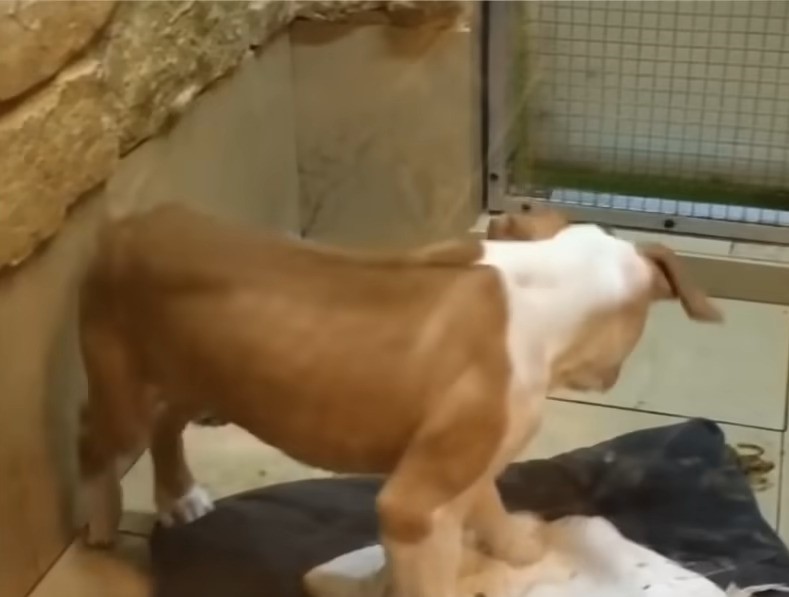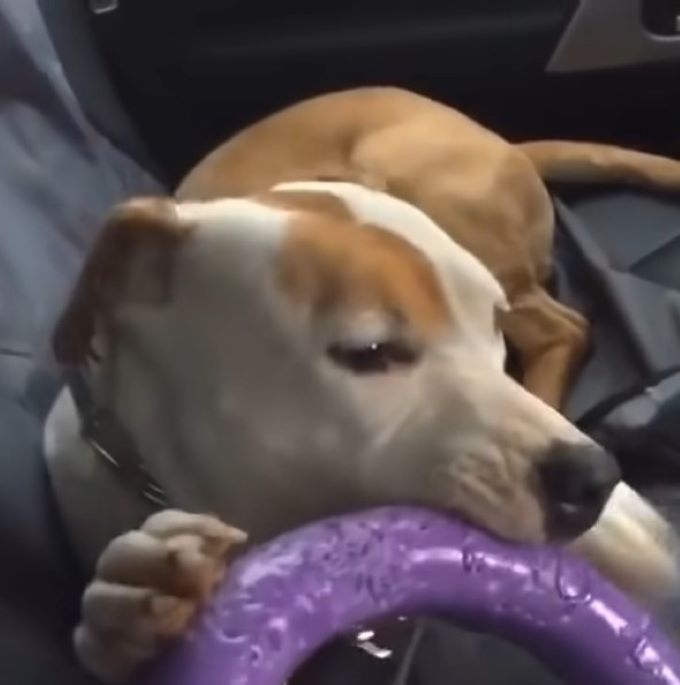Living in a closed-off space can be a scary thing for a lot of dogs. I mean, a lot of them only like to spend time in their kennel when they are sleeping, and sometimes, not even then.
This can be made worse by a lot of neglectful owners who don’t care about their pups and will have them live in awful conditions for prolonged periods.
Such was the case for the dog we will talk about in this story because he was forced to spend a long time in a dirty cage before somebody finally intervened.
She Looked So Anxious

When rescuers were notified about a dog who was living in a horrible and dirty cage, they came to her rescue.
When they first saw her, they were immediately shaken by her state. The cage was absolutely dirty, and there was no telling when she was last fed.
She looked extremely anxious and kept pacing around the small enclosed space. This was enough to make anyone feel heartbroken.
The pup was confused when the rescuers came for her, but she looked fixated on the food they had with them, so they gave her something to eat.
After that, they took her away, and one of the rescuers brought her into her home. She noted how frightened she was at first, but it changed when they got there.

Now that they were in a house, she wouldn’t relax. The dog kept walking around the house, and they noticed that she was still very anxious.
Her lovely rescuer helped her calm down and fall asleep by petting her and placing her in a comfortable spot. She looked so peaceful then.
The very next day, she was taken to a veterinarian clinic, where they did an examination. They did a blood test and were waiting for the results.
The vets suspected that she might have rabies, but this made her rescuer feel just horrible. She didn’t know how to help her other than to wait.
Good News For This Pup

So, the two of them spent a lot of time walking around the park and just enjoying themselves until the results came back.
Some of the medicines they gave her helped relieve her anxiety, and she no longer walks in circles. She also seemed a lot happier now that she was with someone amazing.
They enjoyed themselves, but now it was time for the big news. The results revealed that she did not have rabies. It was such a relief for her rescuer, but there was still more.
The two of them still had to go back to the clinic to discuss further treatment for the dog. More exams revealed that this dog suffered from cerebral insufficiency – hydrocephalus.
It was the left lobe of her brain that was causing the problems. She would be okay so long as she was on a strict medication regimen.

After the difficult news, her rescuer decided that she would do everything in her power to help her. The next day, the pup was discharged, and they went home.
Now that they were together all the time, her rescuer noticed that she was such a smart dog. Anytime she wanted to eat, she would get the bowl and take it to her.
After every big meal, she would just fall asleep on her bed. With each passing day, she was feeling better and making a big change.
It was only thanks to her amazing rescuer who gave her another chance that she is now living her best life in a home where she is loved.
If you’ve noticed your female pup having accidents indoors, it can be quite frustrating. Your furry friend who’s always been house-trained is now leaving puddles where she shouldn’t. As a seasoned dog trainer, I understand the confusion and concern this behavior can bring.
It’s essential to address this issue promptly to get to the root of why your dog’s bathroom habits have taken a detour. Various factors could contribute to this sudden change in behavior, and it’s crucial to identify the underlying cause. Remember, your furry companion might be trying to communicate something through her actions.
Understanding the Behavior: Why Is My Female Dog Suddenly Peeing in the House?
Possible Medical Causes
If your female dog is suddenly peeing in the house, it might be due to underlying medical issues. Urinary tract infections, bladder stones, diabetes, or other health concerns could be causing this behavior. It’s essential to have your furry friend examined by a veterinarian to rule out any medical conditions that might be contributing to her accidents indoors.
Behavioral Reasons
Sometimes, changes in your female dog’s environment or routine can lead to sudden peeing indoors. Stress, anxiety, lack of proper training, or territorial marking could be factors influencing this behavior. Consider any recent changes in your dog’s life, such as a new pet in the house, a change in your schedule, or even unfamiliar scents in the environment. Understanding the triggers behind your dog’s behavior can help you address the issue effectively and support her in adjusting to any changes.
Medical Factors Behind Inappropriate Urination
Urinary Tract Infections (UTIs)
UTIs are a common medical issue in female dogs that can lead to accidents indoors. When your furry friend has a UTI, she may struggle to hold her bladder, causing unexpected urination in the house. If you notice frequent accidents or any signs of discomfort while peeing, it’s essential to consult your veterinarian for proper diagnosis and treatment.
Incontinence Issues
Incontinence, often seen in older female dogs, can be another reason for sudden indoor peeing. Your dog may involuntarily leak urine due to weak bladder muscles, hormonal imbalances, or other underlying health conditions. Discuss your concerns with the vet to explore management options and help your pup stay comfortable and accident-free.
Other Health Concerns
Apart from UTIs and incontinence, other health issues like diabetes, kidney disease, or Cushing’s syndrome can also trigger inappropriate urination. These conditions can affect your dog’s urinary habits and overall well-being. If you observe unusual behavior or changes in your dog’s potty routine, a vet visit is crucial to identify any potential health problems and provide appropriate care promptly.
Behavioral and Environmental Triggers
Anxiety and Stress
If your female dog is suddenly peeing in the house, it could be due to anxiety or stress. Dogs, like humans, can feel overwhelmed in certain situations, leading to changes in their behavior. Loud noises, new environments, separation anxiety, or even changes in their routine can trigger stress in dogs. This anxiety may manifest as indoor accidents, even if your dog is usually well-behaved.
Changes in the Household
Changes in the household can also contribute to your female dog’s sudden indoor accidents. Bringing in a new pet, a new family member, or even rearranging furniture can disrupt your dog’s sense of security and territory. Dogs are creatures of habit, and any significant change in their environment can cause them to feel unsettled, leading to behaviors like inappropriate urination.
Lack of Proper House Training
Another reason why your female dog might be peeing indoors is a lack of proper house training. Even if your dog was initially trained to do her business outside, lapses in reinforcement or changes in routine can cause her to forget or ignore her training. It’s essential to maintain consistent house training methods and provide positive reinforcement to ensure that your dog understands where she should relieve herself.
How to Address the Problem
Seeking Veterinary Assistance
If you notice your female dog suddenly urinating indoors, it’s crucial to seek veterinary assistance promptly. A vet can rule out any underlying medical conditions causing this behavior, such as urinary tract infections, diabetes, or kidney disease.
Adjusting the Home Environment
To address your dog’s indoor urination issue, consider making adjustments to your home environment. Ensure your dog has easy access to the outdoors for bathroom breaks. Additionally, create a comfortable and stress-free space for your dog, as anxiety and stress can lead to indoor accidents.
Training and Positive Reinforcement
Implement proper training techniques and positive reinforcement to tackle your female dog’s indoor urination problem. Consistent house training methods, including scheduled bathroom breaks and rewarding good behavior, can help prevent accidents. Remember to be patient and supportive throughout the training process.
When to Seek Professional Help
If your female dog continues to have accidents indoors despite trying various interventions and training methods, it might be time to seek professional help. Persistent issues with indoor urination could indicate an underlying medical problem or behavioral issue that requires expert attention.
Persistent Issues Despite Interventions
When your efforts to address your female dog’s indoor urination problems don’t yield positive results, it’s essential to consult a veterinarian. A professional can conduct a thorough examination to determine if there are any medical reasons causing this behavior. Persistent accidents despite consistent training may signal the need for a more in-depth investigation to identify and address the root cause.
Identifying Serious Medical Conditions
Seeking professional help becomes crucial when you suspect that your female dog’s indoor urination is due to a serious medical condition. Conditions such as urinary tract infections, diabetes, or kidney disease can manifest through changes in urination habits. A veterinarian can perform tests to diagnose any underlying health issues and recommend appropriate treatment to help your dog recover.
Remember, addressing indoor urination problems in female dogs promptly, especially when interventions have been ineffective, is vital to ensure your pet’s health and well-being. Professional guidance can provide the necessary support and expertise to identify and resolve any medical or behavioral issues contributing to this issue effectively.
Conclusion
So, if your female dog is suddenly peeing indoors, it’s essential to act promptly. Medical reasons like urinary tract infections and behavioral factors such as stress could be the culprits. Remember to consult a vet to rule out any health issues and make your home environment stress-free. Consistent training and positive reinforcement can help. And if the problem persists, seeking professional help is wise. Your furry friend’s health and happiness are top priorities, so don’t hesitate to get the support needed for a solution.
Frequently Asked Questions
Why is my female dog suddenly urinating indoors?
Your female dog may be urinating indoors due to medical causes like urinary tract infections, diabetes, or kidney disease, or behavioral triggers such as anxiety, stress, or changes in the household.
What should I do if my female dog is urinating indoors?
Seek veterinary assistance to rule out medical conditions. Make adjustments to reduce stress, provide easy outdoor access, and implement consistent house training methods with positive reinforcement.
What if my female dog continues to urinate indoors despite interventions?
Seek professional help to identify underlying medical or behavioral issues. Prompt intervention is crucial, especially for serious conditions like urinary tract infections, diabetes, or kidney disease.
[no_toc]

Hey there, I’m Janet Brooks, a dog-loving student from California. I’m all about helping pups in need, especially those without homes. Me and my awesome friends work together to give shelter and love to stray dogs. Oh, and I also write blogs about dogs to share helpful info.